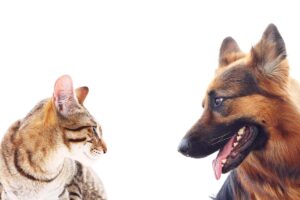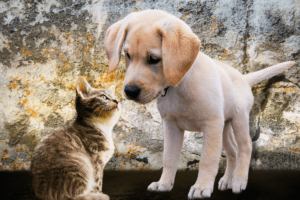Dogs and cats have a well-known reputation for not getting along. While some dogs and cats can coexist peacefully, many dogs will bark, growl, or even chase cats when they come across them. But why do dogs hate cats? This article will explore the reasons behind the age-old feud between dogs and cats. We’ll look at the two animals’ history, their instincts and behaviors, and how their relationship has evolved.
Dogs and cats have different instincts and behaviors that can cause conflicts between the two species. Dogs are packed animals and have an innate desire to hunt and chase prey. On the other hand, cats are solitary hunters and may be perceived as a threat to a dog’s territory. This can cause a dog to become aggressive or territorial towards cats.
Another reason that dogs may dislike cats is due to a lack of early socialization. If dogs are not exposed to cats or other small animals during their critical socialization period, they may become fearful or aggressive towards them later in life.
Moreover, past negative experiences with cats or lack of interaction with them can also lead to a dog disliking cats.
These are generalizations; not all dogs dislike cats, and vice versa. Each dog and cat is unique, and the relationship between them can be influenced by various factors such as the individual dog’s personality, breed, and past experiences, as well as the cat’s behavior and the context of their interactions.
Why do dogs hate cats?

It is a common misconception that all dogs hate cats. In reality, dogs have individual personalities and preferences like humans, and some may be indifferent or even friendly toward cats. However, there are specific reasons why dogs may dislike or even exhibit aggressive behavior towards cats.
One reason is that dogs are naturally territorial animals and may view cats as a threat to their space because dogs have a strong prey drive and may be inclined to chase and hunt small animals, including cats. Can reinforce This behavior through past experiences, such as if a dog has been trained to hunt or has had negative experiences with cats.
Additionally, if a dog is not properly socialized with other animals, it may be more likely to display aggressive behavior toward cats.
Remember that you can modify these behaviors through proper training, socialization, and management of the dog. Also, it’s important to remember that dogs and cats have different behaviors and body languages which may lead to misunderstandings.
What is the reason for dogs hating cats?

Dogs are packed animals and have an innate desire to hunt and chase prey. On the other hand, cats are solitary hunters and may be perceived by dogs as potential prey or competition for food and resources. This can cause a dog to become aggressive or territorial towards cats.
Another reason that dogs may dislike cats is due to a lack of early socialization or past negative experiences with cats. If dogs are not exposed to cats or other small animals during their critical socialization period, they may become fearful or aggressive towards them later in life.
Past negative experiences with cats or lack of early interaction with them can also lead to a dog disliking cats. These are just some of the reasons that can lead to dogs having a negative attitude towards cats, but it’s important to remember that each dog is unique. A variety of factors can influence their behavior.
Why do some dogs have a strong dislike for cats?

One of the main reasons is due to their instinctual prey drive. As pack animals, dogs have the instinct to hunt and chase small prey, and this instinctual drive may lead them to view cats as potential prey and cause them to exhibit aggressive behavior towards them.
A further reason why some dogs may have a strong dislike for cats is due to territorial behavior. Dogs may view cats as a threat to their territory and may act aggressively toward them to protect their home and family.
Additionally, past experiences can also play a role. If a dog has had negative interactions with cats in the past, it may lead to a dislike or even a fear of cats. This can be due to a traumatic experience or a lack of proper socialization with cats during their formative years.
Be informed that not all dogs hate cats and that with proper socialization and training, dogs can learn to coexist peacefully with cats. As a pet parent, it’s essential to monitor your dog‘s behavior around cats and take the necessary precautions to ensure their and your cat’s safety.
Are there any specific breeds of dogs that hate cats?
While no specific breed of dog inherently hates a strong dislike for cats, certain breeds may be more prone to exhibit aggressive behavior towards cats due to their hunting and herding instincts.
Breeds with a strong prey drive, such as terriers, hounds, and some herding breeds, may view cats as potential prey and be more likely to exhibit aggressive behavior toward them.
Furthermore, certain breeds bred for hunting, such as retrievers and pointers, may also be inclined to view cats as prey, as their hunting instincts are strong. However, each dog is unique, and their reactions to different situations can vary greatly. Therefore, it’s not accurate to say that all dogs of a specific breed hate cats.
And also, each dog is unique and may react differently to different situations. Therefore, it’s pertinent to monitor your dog’s behavior around cats and take the necessary precautions to ensure their and the cat’s safety, regardless of their breed.
How can you tell if a dog hates a cat?

The most obvious signs are aggressive behavior, such as growling, barking, lunging, or biting when in the presence of a cat. This behavior can be accompanied by a stiff body posture and a fixed gaze on the cat, indicating that the dog is highly stimulated and potentially a danger to the cat.
Another sign that a dog may strongly dislike cats is if they exhibit high levels of excitement or agitation when they see or smell a cat. This can be indicated by excessive barking, whining, or tail wagging.
Some dogs may also try to chase or hunt cats, even on a leash or in a fenced-in area. If a dog is displaying these signs, it’s essential to take the necessary precautions to ensure the safety of the cat and the dog.
Not all dogs that exhibit these behaviors strongly dislike cats, as some dogs may also show these behaviors due to a lack of proper socialization or training. Therefore, it’s good to monitor your dog’s behavior around cats and take the necessary precautions to ensure their and the cat’s safety.
Is it possible to train a dog to not hate cats?
Training a dog to not hate cats through desensitization and counter-conditioning is possible. Desensitization involves gradually exposing the dog to the presence of cats in a controlled and safe environment. In contrast, counter-conditioning teaches the dog to associate the company of cats with positive experiences such as treats or praise.
The process of desensitization and counter-conditioning should be done under the guidance of a professional dog trainer or behaviorist. It requires a specific plan to be followed, and it is vital to do it at the dog’s own pace to prevent overwhelming the dog or causing more stress.
This process can be done by starting with the dog seeing pictures or videos of cats, then gradually moving to have a cat in a distant room, then in the same room but separated by a barrier, and eventually having the cat close enough to interact with the dog. In contrast, the dog is relaxed and rewarded with treats or praise.
How do dogs react when they encounter a cat?

The way a dog reacts when encountering a cat can vary greatly depending on the individual dog and the specific situation. Some dogs may exhibit a friendly or curious attitude, while others may exhibit aggressive or fearful behavior.
Dogs that have been adequately socialized with cats from a young age or have positive past experiences with cats may be more likely to approach a cat calmly and with curiosity.
On the other hand, dogs that have had negative experiences with cats, or haven’t been socialized with cats, may be more likely to exhibit aggressive behavior, such as barking, growling, lunging, or chasing.
Additionally, dogs that have a strong prey drive or hunting instincts may be more likely to view cats as potential prey and may be more likely to chase or attack.
How does a dog’s past affect their attitude towards cats?
A dog’s past experiences can significantly affect their attitude towards cats. Positive past experiences, such as being raised with cats or being introduced to cats in a calm and controlled manner, can lead to a dog being more comfortable and accepting of cats.
On the other hand, negative past experiences, such as being attacked by a cat or having a traumatic encounter with one, can lead to a dog developing a fear or aggressive behavior towards cats.
Besides, a dog’s early socialization period, which is the time between 3 to 14 weeks old, is critical for them to learn and adapt to different experiences, including encountering cats. Suppose a dog is not exposed to cats during this period or has negative experiences.
In that case, they may be more likely to develop a fear or aggressive behavior towards them later in life. Dog’s past experiences are not the only factor affecting their attitude towards cats. Other factors such as genetics, breed, and individual temperament also play a role.
However, understanding a dog‘s past experiences with cats can give insight into why they may have a confident attitude toward them and can inform how to approach training and behavior modification in the future.
Are there any behavioral issues associated with dogs hating cats?

Behavioral issues are associated with dogs that strongly dislike or hostility toward cats. One of the most apparent issues is aggressive behavior, such as growling, barking, lunging, or biting when in the presence of a cat. This aggressive behavior can be dangerous for the cat, the dog, and the humans around them.
Another behavioral issue associated with dogs that hate cats is anxiety and fear. Suppose a dog has had negative past experiences with cats or has not been adequately socialized with them.
In that case, they may develop a fear of cats which can lead to anxious behavior such as excessive barking, whining, or cowering when encountering them. This can cause the dog distress and can also impact the dog’s overall well-being.
Additionally, a dog with a strong prey drive may exhibit chasing behavior even when on a leash or in a fenced-in area. This can be a dangerous situation not only for the cat but also for the dog, as they may end up getting hurt or lost.
Can dogs and cats coexist peacefully?
Dogs and cats can coexist peacefully. Dogs and cats can learn to live harmoniously with proper socialization, training, and management.
Proper socialization and training are critical for dogs and cats to tolerate each other’s presence. We can do this by gradually introducing them to each other in a controlled and safe environment and by teaching the dog to associate the company of cats with positive experiences such as treats or praise.
Additionally, to reduce competition and potential conflicts, it’s essential to provide each animal with its own space and resources, such as beds, feeding areas, and toys.
Introducing a dog and cat takes time, patience, and the guidance of a professional, as it’s essential to do it at the dog’s own pace to prevent overwhelming the dog or causing more stress.
Also, it’s crucial to monitor the animals’ behavior and adjust the management accordingly to ensure their safety and well-being. With proper management and training, dogs and cats can learn to live together peacefully and form a positive bond.
How does the age of a dog affect their attitude towards cats?

A dog’s age can have an impact on its attitude toward cats. Younger dogs, particularly puppies, may not have had much exposure to cats and may not have developed a strong preference or aversion towards them.
In these cases, a puppy’s attitude towards cats may be shaped by their training and socialization experiences. Puppies that are correctly socialized and positively exposed to cats may be more likely to have a friendly or neutral attitude toward them.
On the other hand, older dogs may have had more experiences with cats, both positive and negative, and may have developed a more decisive attitude toward them. For example, an older dog with a history of being chased or attacked by cats may have a strong aversion toward them and may display aggressive or defensive behavior.
Conversely, an older dog with positive experiences with cats may have a more relaxed or friendly attitude toward them. The age of the dog can also be related to their exposure to cats in their past life which can shape their perspective.
Are there similarities between why some cats hate dogs and some dogs hate cats?
One similarity between the two behaviors is that they are often driven by hunger or a lack of food. For example, if a dog is living in an area where food is scarce, it may hunt and consume cats as a means of survival.
If a cat is living in an area where food is scarce, it may turn to hunting and consuming small dogs or other small animals to survive.
Another similarity between the two behaviors is that they may be driven by instinct or lack proper socialization. For example, if a dog has been bred or trained for hunting, it may have a strong instinct to chase and consume small animals, including cats.
Similarly, if a cat has been raised in the wild or in an area where they have not been socialized with domestic animals, it may have a strong instinct to hunt and consume small animals, including dogs.
It is important to note that this behavior is rare, and most cats and dogs have not and will not consume other animals.
What are the common triggers that cause a dog to hate cats?

Several common triggers can cause a dog to develop a strong aversion or dislike towards cats. Some of these include:
1. Negative experiences: If a dog has had a negative experience with a cat, such as being chased or attacked, it may develop a strong dislike or fear of cats. This can also happen if a dog has witnessed a negative interaction between a cat and another dog.
2. Lack of socialization: Dogs that have not been adequately socialized to cats, or have not been exposed to cats at all, may be more likely to develop an aversion to them.
3. Instinct: Some breeds of dogs, such as terriers and hounds, were initially bred for hunting small animals, including cats. These breeds may have a strong instinct to chase and hunt cats and may need proper training and socialization to overcome this instinct.
4. Training: If a dog has been trained to guard or protect their home or property, it may view cats as intruders and display aggressive or defensive behavior towards them.
5. Medical condition: Some underlying medical conditions may cause a dog to become more territorial or aggressive towards other animals, including cats.
Always note that not all dogs will hate cats, and a lot of this can be influenced by the individual dog and its experiences. Training, socialization, and proper management can help dogs to coexist peacefully with cats.
Conclusion
Why do dogs hate cats? Dogs can develop a strong aversion or dislike towards cats for various reasons. Negative experiences, lack of socialization, and certain breeds’ hunting instincts can all contribute to a dog’s dislike of cats. Additionally, training and certain medical conditions can also play a role in a dog’s attitude toward cats. It is important to note that not all dogs will hate cats, and proper training, socialization, and management can help dogs coexist peacefully.
Dog owners must understand that dogs are individuals, and each dog may have unique experiences and circumstances that shape its attitude toward cats.
If dog owner is concerned about their dog’s attitude towards cats, they should consult with a veterinarian or a professional dog trainer to determine the best course of action. Proper management and training can help dogs and cats coexist peacefully and avoid negative interactions.


